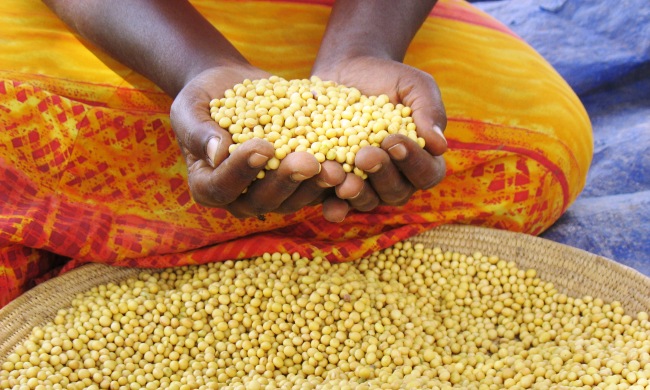Makerere University through the Centre for Soybean Improvement and Development has developed six high yielding–rust resistant soybean varieties (Namsoy 4M, Maksoy 1N, 2N, 3N, 4N and 5N). Recent impact studies indicated that over 90% of the soybean varieties grown in Uganda are developed by Makerere University (Obaa and Tukamuhabwa, 2015).
Why the Maksoy Soybean varieties?
In 1996, Soybean rust (Phakopsora pachyrhizi Syd.); one of the most devastating soybean diseases in the world was detected in Uganda, leading to yield losses of up to 100%. By 2000, farmers had lost interest in growing soybean since it was no longer profitable. To address this problem, researchers at Makerere University embarked on soybean research and breeding activities in major soybean growing areas in Uganda using a participatory approach that led to the development of six high yielding-rust resistant soybean varieties.
Impact of MakSoy Soybean varieties
With over 80% of the people living in Uganda engaged in Agriculture, the Maksoy high yielding rust resistant varieties have transformed the soybean sector in Uganda and improved livelihoods.
Soybean production in Uganda steadily increased from 144,000 hectares in 2004 to 200,000 hectares in 2014 (Tukamuhabwa and Oloka, 2016). Soybean prices increased from 600 UGX per kg in 2008 to 1000 UGX per kg in 2011 (SNV, 2011).

Similarly, soybean export earnings grew from USD 300,000 in 2006 to USD 1,163,000 in 2009; an increase of 288% (Ssengendo et al., 2010).
The varieties have also provided steady supply of soybean grain for the ever growing processing plants in Uganda. “The processing capacity increased from 300 tons in 2009 (Anon, 2010) to over 600 tons in 2011” (SNV, 2011).
 Furthermore, the quantity of soybean foundation seed increased from 2 tons in 2010 to 15 tons in 2014 per season and risen to over 40 tons in the year 2015.
Furthermore, the quantity of soybean foundation seed increased from 2 tons in 2010 to 15 tons in 2014 per season and risen to over 40 tons in the year 2015.
Future Prospects of Maksoy Soybean varieties
Maksoy Soybean varieties are a success story. Given the demand presented by human and livestock needs, we highly encourage farmers, private sector, industry and funders to grow these high-yielding disease-resistant varieties.
This article is a Research Uptake Communication collaborating between Dr. Phinehas Tukamuhabwa and Mr. Tonny Obua together with the Mak Research Uptake Communication team, Ritah Namisango, Marjorie Kyomuhendo and Jane Anyango-Communication Officer, CAES.
Researcher

Dr. Phinehas Tukamuhabwa,
Associate Professor,
College of Agricultural and Environmental Sciences (CAES),
Makerere University
Email: p.tuka[at]caes.mak.ac.ug
It was informed by an existing publication:
For print only: Tukamuhabwa P and Oloka H.K “Soybean Research & Development in Uganda: A case of paradigm shift in an African University.” (2016) Makerere University Agricultural Research Institute, Kabanyolo (MUARIK), Makerere University, Kampala.
For online: Tukamuhabwa P and Oloka H.K “Soybean Research & Development in Uganda: A case of paradigm shift in an African University.” (2016) Research News. News Portal, Makerere University. http://news.mak.ac.ug/2016/01/mak-developed-disease-resistant-high-yielding-varieties-dominate-market 28th March 2016


 General9 hours ago
General9 hours ago
 General9 hours ago
General9 hours ago
 Humanities & Social Sciences1 week ago
Humanities & Social Sciences1 week ago
 General1 week ago
General1 week ago
 Agriculture & Environment2 weeks ago
Agriculture & Environment2 weeks ago


